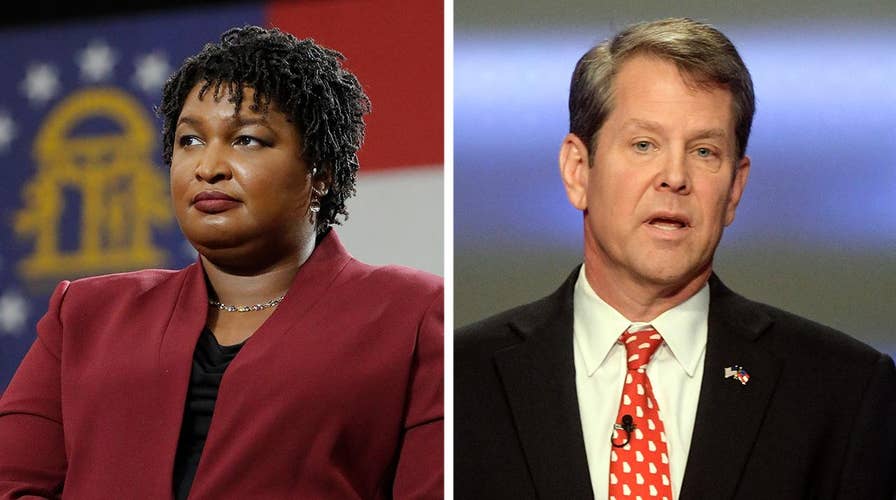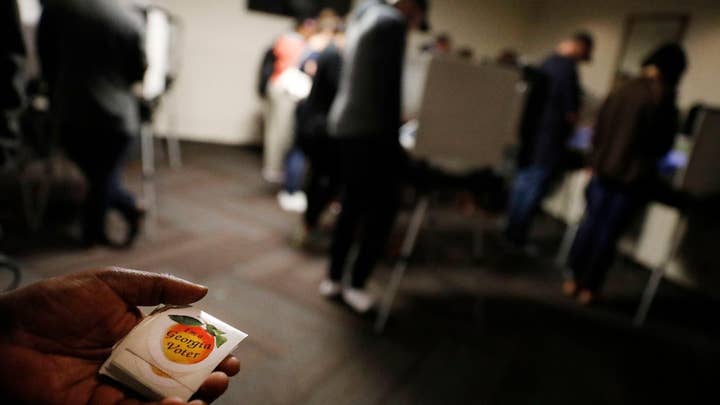Stacey Abrams vs. Brian Kemp in Georgia
'Atlanta Journal-Constiution's' Greg Bluesmen provides insight into the gubernatorial race.
Georgia’s gubernatorial election fight appears to be far from over, with Democrat Stacey Abrams' campaign digging in and predicting a runoff even as Republican candidate Brian Kemp declares victory and resigns from his post as secretary of state.
Kemp resigned as secretary of state Thursday morning in federal court. Russ Willard, a lawyer with the attorney general’s office, said Kemp will not perform any election-related duties. An interim secretary will oversee the rest of the vote counting.
His resignation came ahead of a hearing Thursday for a lawsuit brought against Kemp by five Georgia voters, who urged that Kemp be barred from exercising duties as the state’s chief elections officer during the vote count. The Abrams campaign also has accused Kemp of using his role as secretary of state to influence the process.
According to the Associated Press vote totals with all precincts reporting, Kemp has 1,972,952 votes to Abrams’ 1,909,730 –giving him 50.3 percent to her 48.7 percent. A first-ever gubernatorial runoff could have been triggered if neither candidate had cleared the 50 percent mark. At a Thursday news conference with outgoing Republican Gov. Nathan Deal, Kemp said only about 20,000 provisional ballots remain uncounted in the gubernatorial race. He said that even if Abrams "got 100 percent of those votes, we still win."
But Abrams, who is vying to become the nation’s first black female governor, has said that because ballots have yet to be counted, a runoff next month is still a possibility. The campaign said at a Thursday press conference they will fight to get all outstanding votes counted, calling on the secretary of state's office to "release all the data, all the numbers, and they need to count every single vote."
Her campaign manager, Lauren Groh-Wargo, also argued several factors must be weighed when considering a runoff election.
“We have three factors to be considered here: outstanding votes, absentee ballots to be counted, and provisional ballots. Given those three issues, we believe this is likely heading to a runoff,” she said.
Groh-Wargo said this week that Kemp, who declared victory Wednesday evening, had offered “no proof” of his win.
“He’s offered … no indication of why we should take him at his word,” Groh-Wargo told the Associated Press. “The sitting secretary has declared himself [the winner.]”
The campaign on Wednesday also announced what it called an "aggressive provisional ballot chase program to ensure that every eligible voter’s voice is heard, and every ballot is counted."
Meanwhile, Kemp’s press secretary Cody Hall stood by the declaration.
“Brian Kemp earned nearly two million votes on Tuesday—by far the most of any gubernatorial candidate in our state’s history,” Hall said in a statement. “Absentee ballots are counted and Kemp leads his opponent by 64,000 votes.”
He added: “Based on counts released by the Secretary of State’s office, Brian Kemp’s margin is so large that the number of provisional ballots and overseas ballots will not change his Election Day victory. Simply put, it is mathematically impossible for Stacey Abrams to win or force a run-off election.”
Kemp’s former spokesperson in the secretary of state’s office, Candice Broce, said the lawsuit forcing Kemp’s secretary of state resignation was a “twelfth-hour stunt.”
The Georgia race was among the most closely watched gubernatorial contests nationally. Democrats seized several state governorships from Republicans on Tuesday night, but fell short in Iowa, Ohio and Florida—three states former President Obama won in 2012, but that President Trump carried in 2016.
Control of the nation’s governor’s mansions is expected to be particularly important in 2020, when states draw new congressional district lines, which can be vetoed by the chief executives.
The Georgia contest was marked with drama and intrigue long before the final votes were cast. Kemp announced on Sunday his office was investigating "possible cyber crimes" by the Georgia Democratic Party, throwing a last-minute wrench into what was already a tight race. Abrams and the state Democratic party swiftly rejected the allegations, claiming there was "never a hack" and declaring it was a feeble attempt to "suppress the vote."
Abrams was hoping to make history Tuesday night, as well as break a decades-old red streak of gubernatorial victories in the Peach State. The state hasn't elected a Democratic governor since 1998. However, Abrams previously emphasized she didn't want people to support her based solely on those reasons.
“I don’t want anyone to vote for me because I’m black. And no one on the ballot needs a vote because we’re women. And I don’t even want you to vote for us just because we’re Democrats. You need to vote for us because we’re better," she told a crowd in Savannah Monday.
Both candidates were backed by big-name celebrities and political heavyweights: Kemp boasted the support of Heisman Trophy winner Herschel Walker, President Trump and Vice President Pence, while Abrams claimed Oprah Winfrey and former President Barack Obama among her supporters.
"Make history here in Georgia. Make things better here in Georgia," Obama urged a crowd of voters last week while endorsing Abrams at Morehouse College in Atlanta.
Meanwhile, Trump stumped for Kemp, whom he described as an "incredible fighter and tireless champion for the people."
Fox News’ Gregg Re and The Associated Press contributed to this report.






